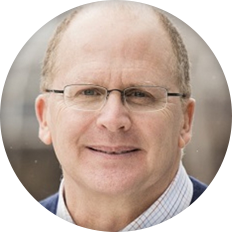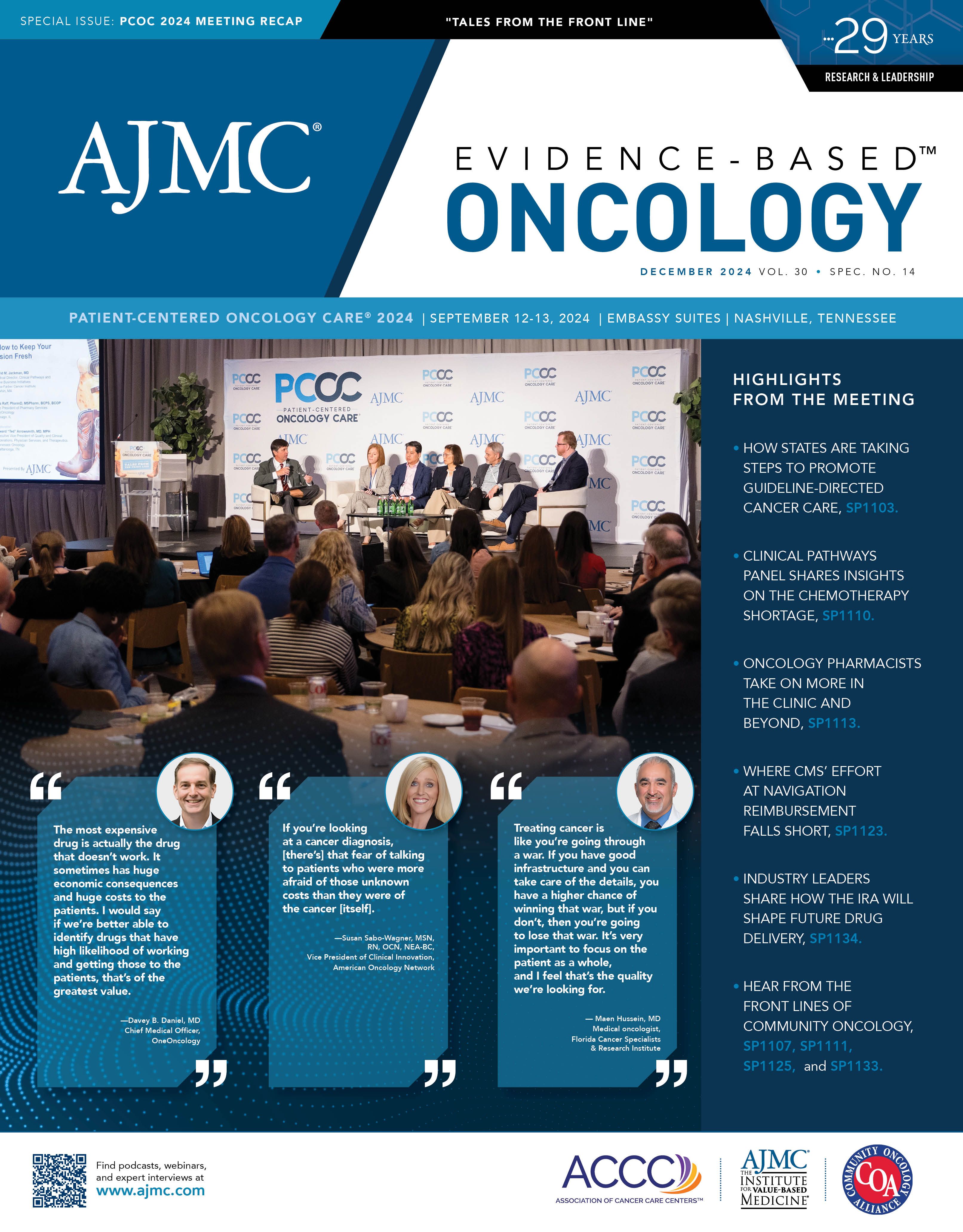- Center on Health Equity & Access
- Clinical
- Health Care Cost
- Health Care Delivery
- Insurance
- Policy
- Technology
- Value-Based Care
SPOTLIGHT: “I Didn’t Go to Med School to Learn How to Save People Money”
A. Mark Fendrick, MD, co-editor in chief of The American Journal of Managed Care, is a professor in the Division of General Medicine, Department of Internal Medicine and a professor of Health Management and Policy at the University of Michigan, where he is also director of the Center for Value-Based Insurance Design. Fendrick reflected on the discussions at the annual meeting of Patient-Centered Oncology Care (PCOC).
A. Mark Fendrick, MD

I’m really happy to be here at the PCOC meeting. In my 4 decades of work, trying to spend our money more efficiently and more equitably in health care, I have to say, as a clinician as well as a family member of a patient, it’s never been a better time to think about the amazing innovations in preventing cancer, diagnosing cancer, and treating cancer. But irrespective of these incredible innovations, at most of these meetings, people talk about money, and they don’t talk about health.
In many of the important policies in cancer care and delivery, the well-meaning intentions of these value-based programs—utilization management, health plan benefit designs, and even the Medicare drug price negotiation—aim to lower spending. I didn’t go to med school to learn how to save people money. I went to medical school to learn how to make individuals and populations healthier.
So, how can we fix this? I think while people are lamenting the cost of these expensive, but incredibly high-value cancer diagnostics and treatments, everyone agrees there’s enough money in the system. I think if we would all come together and buy more of the good stuff and less of the bad stuff, we wouldn’t be in the conundrum that we’re in.
If you think about how we’re paying clinicians, most programs are not clinically driven. They’re driven by financial terms. So, it’s our hope that as we move from volume to value, we’ll actually put the patient first. A question arises—are we spending too much on cancer care? And the answer to people who do stuff may be too low. [For] the people who buy stuff, it may be too high, but it really comes down to the fact that we have to get serious about measuring the services that we should be providing more of, and hopefully think about getting rid of those services that, at best, don’t make patients healthier and in some situations actually cause harm. Having the courage to identify and measure and get rid of those services that we shouldn’t be buying will not only reduce financial issues, but will allow us to free up some funds to buy some of these amazingly important innovations in cancer care that are currently being underused.
We all know, and it’s discussed in detail here at PCOC, that people aren’t getting the care they need. Health care costs are going through the roof.
Many may not know that health care costs are the among the top causes of personal debt in this country. They’re the No. 1 cause of personal bankruptcy,1 and, by far, the No. 1 reason for online fundraisers.2 The last thing I want is my patient who potentially has access to a drug that was designed to treat her cancer not be able to get it.
Out-of-pocket costs—not the cost of drugs—are the top priority. As I’ve said for years at AJMC and at PCOC meetings, Americans don’t care about what a drug costs. They care about what it costs them.
While some of you have the intellect and sophistication to decide what list prices and net prices should be, please take my patients out of the equation and not require them to not pay their rent, to not buy healthy food, to not be able to buy gas, but to be able to afford treatments. This may actually not only save their life but positively impact them.
Let’s talk about 2 specific issues: first, the preventive services provision of the Affordable Care Act, and second, the Inflation Reduction Act in ways oncologists could actually help move this volume to value forward. As most of us know, in the preventive services provision of the Affordable Care Act for cancers, breast, cervical, colorectal and lung, the initial screening test is covered at 100%, and we’ve shown that there’s been a remarkable increase in the number of people who receive those tests.
However, for those few people who test positive, the reason why we do these screenings, those people who actually pay have to pay significant amounts out of pocket. It frustrates me a great deal to know that my patients who get a free cervical cancer test, a free screening mammogram or a stool test at home, previously, they had to pay lots of money out of pocket to find out whether they had cancer.
Thankfully, the American Cancer Society, along with others, has put forward statements on the subject,3 and I hope each of you in the cancer community will get behind a movement to make sure that follow-up diagnostic tests for screenable cancers are easy, not hard, for patients to get. It shouldn’t surprise you at all that not only do high prices negatively impact underserved populations such as Black and Brown communities or those who are financially insecure, but the evidence of programs that remove cost-sharing for high value services are particularly beneficial to those populations that we worry about, and that value-based insurance design programs that remove or lower cost sharing actually are equity-enhancing.
So, some key takeaways here are some messages from a primary care provider to see how oncologists can help move the volume to value. First, try your best to identify high-value services and push your carriers to lower cost sharing on these essential services, remind your Medicare patients about the new annual out-of-pocket drug cap and to enroll in the voluntary Medicare prescription payment plan, which is known as smoothing. While all of our Medicare beneficiaries, a predominance of patients with cancer in this country, are enrolled in Medicare Part D, a significant minority will benefit from the cap. Those who we worry about the most, who can’t even pay $2000 in January, if necessary, would benefit immensely if they can enroll in this program that will allow to smooth that $2000 over the years. Also, remind your payer to make sure that these follow-up services are covered generously.
How do we pay for them to have the courage to identify services in cancer care and elsewhere that don’t provide benefit and sometimes cause harm? I think we finally get around to having the courage to identify, measure and hopefully get rid of them. We will have some incremental funding to pay for follow-up cancer care to follow for exciting things such as [chimeric antigen receptor] T-cell therapy and not have to continually go to these conferences and talk about how various stakeholders are trying to put barriers in front of us, providers and our patients to be able to get the care they need. Think about the patient first. Remember we did not go to medical school, pharmacy school, or therapy school to save people money, but we have to understand that we can’t give everyone all things at no price, and the more we pay attention to the good stuff and less of the bad stuff, I think the better off we will all be.
References
1. Himmelstein DU, Thorne D, Warren E, Woolhandler S. Medical bankruptcy in the United States, 2007: results of a national study. Am J Med. 2009;122(8):741-746. doi:10.1016/j.amjmed.2009.04.012
2. Sisler J. Crowdfunding for medical expenses. CMAJ. 2012;184(2):E123-E124. doi:10.1503/cmaj.109-4084
3. American Cancer Society position statement on the elimination of patient cost-sharing associated with cancer screening and follow-up testing. American Cancer Society. February 26, 2023. Accessed November 12, 2024. https://www.cancer.org/health-care-professionals/american-cancer-society-prevention-early-detection-guidelines/overview/acs-position-on-cost-sharing-for-screening-and-follow-up.html

